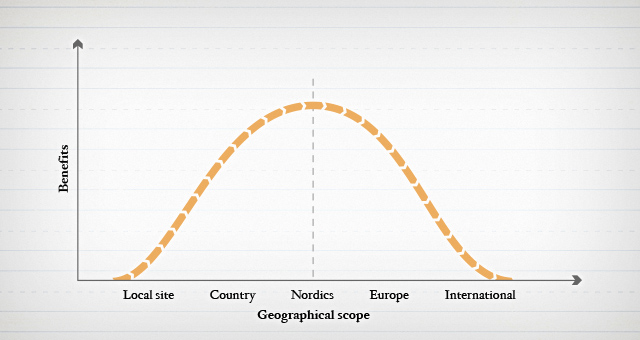
Optimal FM scope
Large corporations are now evaluating global outsourcing of FM services, with the drivers most recently cited being cost savings and rationalization. But there is a cutoff point where the positive effects go negative.
The question of the optimal FM scope is central to many multinationals. The previous rule of tendering site by site has now been shifted to many deciding to integrate solutions country by country, or region by region. The scope of tenders is getting wider, with an outward progression.
 Jens Ebbe Rasmussen, Coor Service Management's Business Development Manager, has a good insight into how many multinationals are thinking. He sees a clear trend.
Jens Ebbe Rasmussen, Coor Service Management's Business Development Manager, has a good insight into how many multinationals are thinking. He sees a clear trend.
"Large corporations are extending their scope, that's obvious. The primary drivers are operational cost synergies. Other benefits include harmonizing levels of service between plants/countries. Businesses can offer more compact client functions, which increases efficiency and delivers more service per unit cost," he explains.
Control is another key consideration—monitoring and follow-ups are far better now thanks to IT tools, with features including reports offering more detail and generating superior decision-support data being available in real time. This means wider service scope can be controlled and managed far more easily than previously.
But there is a cutoff point. When the scope shifts towards excessively large and heterogeneous regions, or out-and-out globalization, things get more complex and problematic. Admin costs increase. Cultural differences, legislation and differing working methods obstruct implementation. Meanwhile, the market for providers for such broad-based solutions is highly limited, which obviously adversely affects clients' negotiating positions.
There’s a fairly clear cutoff point when tendering processes reverse and the outcome is counter-productive.
Experience indicates that global tendering doesn't really work so well. There's a fairly clear cutoff point when tendering processes reverse and the outcome is counter-productive. It's also difficult to roll out the same working methods and methodologies worldwide—the cultural differences are too great," continues Jens Ebbe.
Jens Ebbe's view is that the scope of tendering is clearly widening, but the trend isn't moving towards global tenders, but rather, something more multi-local.
"You have to find the optimal tendering territory. The Nordics is a region that many entities view as obvious. There are several multinational players that have decided to coordinate FM services Nordic wide, like TeliaSonera, Fortum and Telenor.
The reason for this is that there are more similarities than differences between the Nordic countries. We share similar languages, cultures, values and working methods, which create the right potential for tendering on a regional basis.
"There's a lot that's consistent in a pan-Nordic perspective. For example, we think Finnish companies with large operations in Sweden and Finland can really benefit from collective FM solutions."
To succeed in expanding the scope of FM, you have to adopt the right approach. Jens Ebbe warns against biting off more than you can chew.
"My advice to anyone that wants to expand this process is to create a model in your own country that works, then run a pilot of the solution that can be rolled out over time. Don't try to do everything at once, but give the process time. In that way, you have good potential to succeed.

Jens Ebbe Rasmussen
Senior Vice President Business Development
